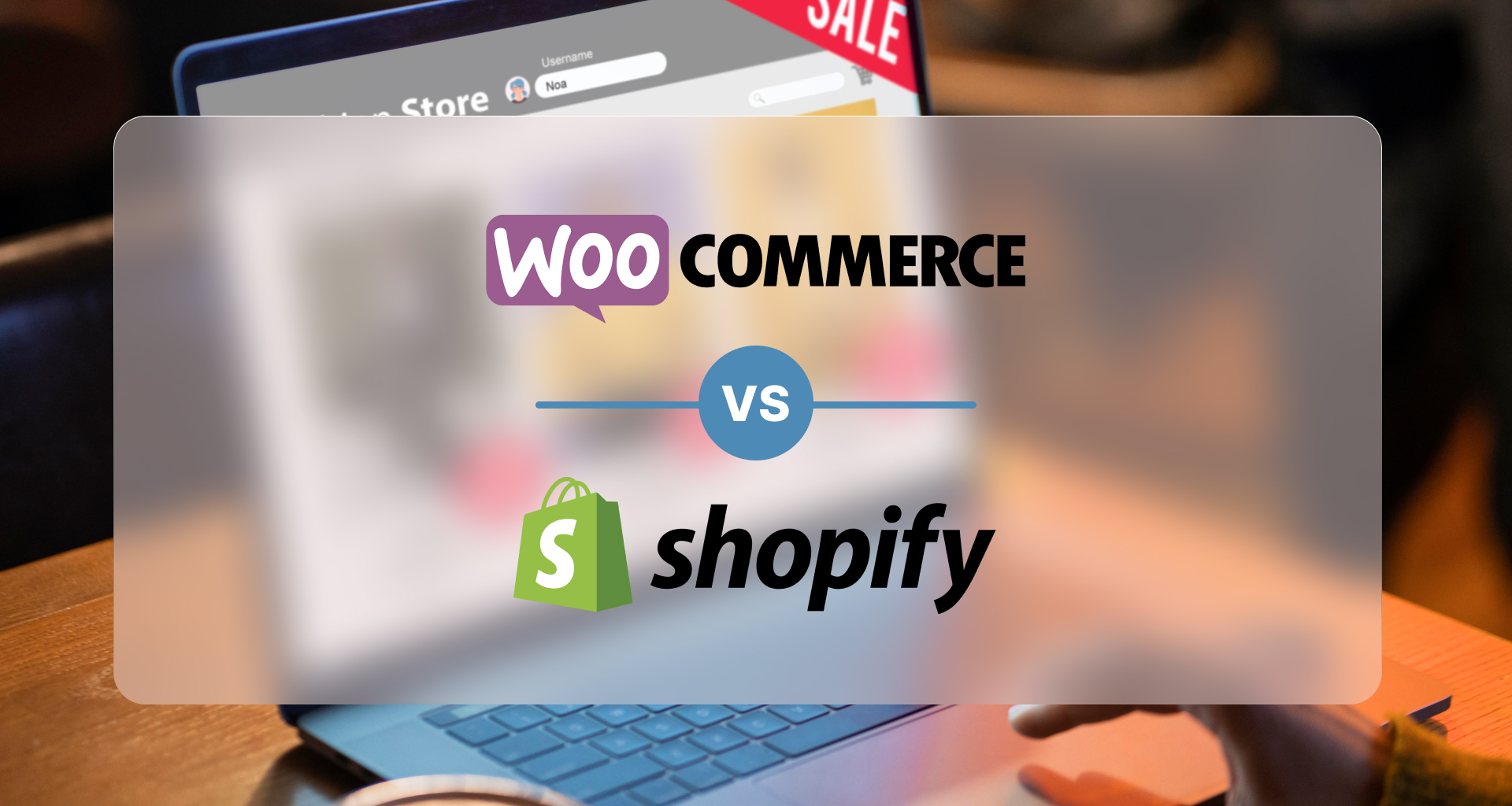WooCommerce vs Shopify – What’s Good For Your eCommerce Website Development
WooCommerce and Shopify are the two most widely used eCommerce platforms nowadays. Over 5 million users have reportedly collected billions of dollars worldwide with these two platforms. In this blog, we analyze WooCommerce vs Shopify so you can choose which is the most suitable choice for your web-based business. We'll carefully examine the capabilities, price, usability, customer service, and other aspects of each platform.
What Is Shopify?
You can easily create an online store, collect money, and keep track of your stock all from a single platform with Shopify, a one-stop eCommerce solution. The technical facets of running an eCommerce site, such as web hosting, security, caching, etc., are taken care of by Shopify, so you have nothing to worry about.
What Is WooCommerce?
An open-source eCommerce plugin for WordPress was created by the name of WooCommerce. You can employ the most potent content management system (CMS) to operate an online business by this. WordPress powers 43% of all websites, making it the world's most widely used website creator. The most popular eCommerce platform is WooCommerce, nevertheless. Even more people utilize it than Shopify.
WooCommerce is open-source, so you can quickly add custom plugins and customize any element of your business. Your requirements and degree of skill are the considerations that should be considered while deciding between the two platforms.
Who Should Choose Shopify?
- Anyone who wishes to have security concerns handled for them and 24/7 assistance.
- If one needs to launch a website quickly but lacks the necessary technical expertise.
- Anyone seeking simple-to-customize, slick templates.
Who Should Choose WooCommerce?
- Anyone who wants to launch a dream project that demands a lot of customization.
- Those who are looking to create a large-scale internet store with multiple locations.
- Those who are technically skilled need more control over the hosting of their website.
Comparison Between Woocommerce And Shopify
Twenty-one percent of the top one million e-commerce websites adopt Shopify. On the other hand, WooCommerce powers 23% of these top websites' online stores. On websites with more authority, WooCommerce might be more popular with customers. However, both of these mediums still have a lot of potential to expand in the enterprise market. WooCommerce is noticeably more common when we look outside of the commercial market. It is utilized on over six million active websites, compared to four million active websites powered by Shopify. Compared to WooCommerce, Shopify has continuously received greater search attention over the last five years, according to Google Trends. While Shopify is a stand-alone platform that doesn't require any coding or hosting experience, WooCommerce is an extension of WordPress. In order to better grasp the differences between the two, let's compare them across a number of features.
WooCommerce vs Shopify: Pricing
- WooCommerce is free to install, and the plugins are generally inexpensive, allowing you to expand the capabilities of your online shop at a cheap cost. This reflects great value for money. Choosing a hosting provider and paying a domain name price are requirements for WooCommerce. They can differ, with hosting running about $120 per year and domain name registration at $15.
- Because of Shopify's open pricing model, it's simple to estimate the platform's price already. An entry-level Shopify ($39) plan, a Shopify ($105) plan, or an advanced Shopify ($399 plan) are your options. You aren't concerned about paying extra for third-party hosting, themes, or extensions because your price plan covers all you require to run your online store with Shopify. Remember that higher-level pricing options can include features you don't require, causing you to pay for services you won't make use of.
- WooCommerce is a more affordable solution because it is free and includes no transaction fees. So, It's important to take into account all expenditures, such as hosting, templates, and plugins. All of the resources you use for your online store are covered by Shopify's pricing plans, however, the cost may rise as you expand and may also include resources that are not used. The best choice finally depends on your unique requirements and spending capacity.
WooCommerce vs Shopify: Ease of Use
- You don't need to know any code to build a wonderful online store because hosting and protection are both included in Shopify's hosted software.
- For beginners, WooCommerce is not as user-friendly as Shopify, WooCommerce makes it difficult to create the type of web store you want without any technical experience.
- Due to its clear and simple interface, which makes it simple for even non-technical users to configure and maintain their businesses, Shopify is often thought of as being more user-friendly than WooCommerce in terms of usability.
WooCommerce vs Shopify: Security
- As a hosted platform, Shopify is primarily in charge of safeguarding your store from cybercriminals. Additionally, the platform includes a few crucial security features right out of the box, such as an SSL certificate. Internet consumers are reassured by this certificate that the current website is reliable. Shopify's built-in SSL could assist you in securing some more transactions in this way.
- The WooCommerce plugin, in comparison, lacks integrated security. You must take precautions to protect your store from hackers. Again, this necessitates the installation of certain extra plugins. There are several top-notch plugins available for your selection. Moreover, you will be responsible for obtaining all necessary sales certificates.
WooCommerce vs Shopify: Support
- With Woocommerce, you can help yourself by using the official website's substantial documentation, tutorials, and guidelines. Additionally, they provide forums where you may ask questions and receive answers from the WooCommerce support staff as well as other users and professionals. Those who get a premium plugin or theme now have access to 24-hour chat assistance. Users of WooCommerce can submit a support ticket and receive assistance by using the in-depth support tab. There are a tonne of online forums as well.
- Shopify offers live chat, phone, email, and Twitter assistance around the clock. Shopify provides full instructions, how-to manuals, a library of information, video lessons, and forums for users who want to handle problems on their own. Additionally, it keeps an updated list of Shopify Experts you can contact for additional assistance or to integrate a different service. However, Shopify doesn't offer assistance with any third-party applications or layouts that you use. Certain documents can be easily found and searched for in the Shopify Help Centre. It also enables one to speak with a specialist directly.
- Compared to WooCommerce, Shopify provides greater customer service, as it has a specialized support team that can offer knowledgeable guidance on technical problems, marketing strategies, and sales. On the other hand, WooCommerce doesn't have a dedicated support staff.
WooCommerce vs Shopify: Integrations and Add-ons
You must add additional features as your online store expands in order to speed up the expansion process. While both WooCommerce and Shopify have a wide range of integrations and add-ons, let's see which platform excels in this regard.
- Since WooCommerce is an open-source platform, its functions can be performed by plugins and extensions. Over 55,000 possibilities are available in its plugin directory.WooCommerce features a huge library of plugins and extensions because of its open-source design and connection with WordPress. The WordPress repository has an enormous number of free WooCommerce add-ons and extensions that are simple to search and download.
- Shopify has a robust API and an App Store where you can purchase third-party add-ons for your store on the platform. Every feature that you want to include in your business is covered by the hundreds of apps they have available. In terms of amount, Shopify has fewer extensions and add-ons than WooCommerce. This is due to the fact that getting an app featured in their store might be challenging.
- Due to its extensive library of plugins and extensions, which gives users additional freedom and customization possibilities, WooCommerce dominates in this category. The variety of connectors and add-ons that are available to users may be constrained by Shopify's exclusive nature. Although Shopify currently offers a wide variety of add-ons, WooCommerce has the advantage due to its open-source design and WordPress connection.
Final Thoughts
Every firm has a set of particular needs that must be satisfied. And if you want to enter the world of e-commerce smoothly, you need to pick the platform that best meets your requirements. Shopify combines robust e-commerce functionality with an easy setup process if you need to quickly start an online store. Although it doesn't require any specialized technical knowledge, it has a downside in that you don't control the platform and must pay a fee on each sale. If you value personalization above all else and are prepared to put in the extra effort to achieve the online store of your goals, WooCommerce is better for you. You will need to have some technical knowledge, but WooCommerce is the way to go if you want to create a huge online store that sells in many different regions. A current WordPress website can be upgraded with WooCommerce to become a potent e-commerce platform. WooCommerce offers to provide you total control over your online store with a large ecosystem of plugins, extensions, and themes. However, for it to run efficiently, you must pick a reputable web host. It's ultimately up to you to choose what your business requires and deserves.




.png)